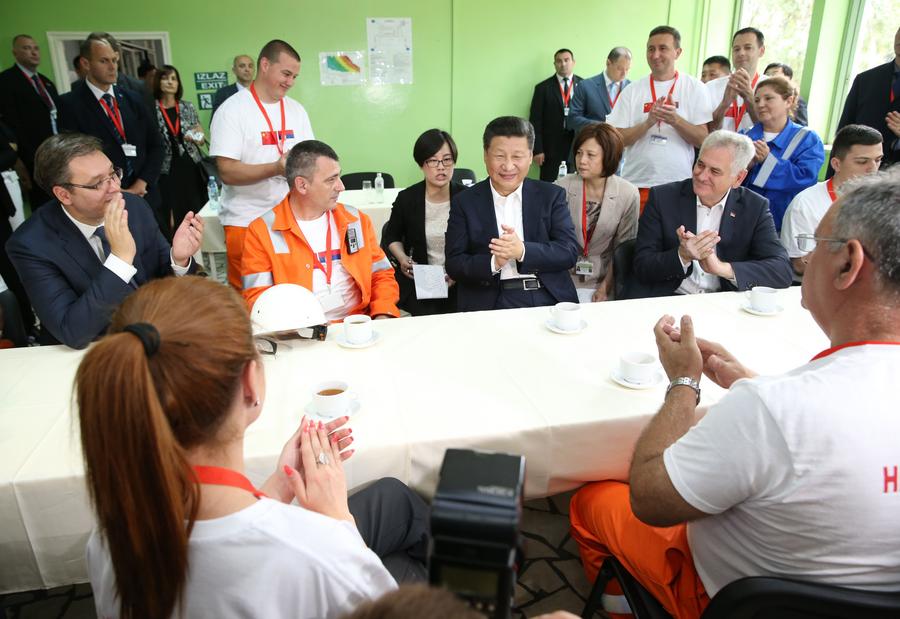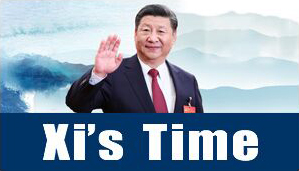BELGRADE/BEIJING, May 7 (Xinhua) -- Situated by the scenic Danube River, the Smederevo Steelworks had long been hailed as the pride of Serbia before it slid to bankruptcy more than two decades ago.
Thanks to the deepening of the high-quality Belt and Road cooperation between China and Serbia, the century-old factory made a remarkable comeback in 2016 when its Chinese partner arrived.
In just a couple of months, the steel mill started turning a profit. It has now become one of the world's largest iron and steel makers and integrated service providers measured by production capacity.
The rebirth of the steel mill stands as a key epitome of the broader practical cooperation between the two countries.
As Chinese President Xi Jinping is about to pay his second state visit to the European country, expectations are running high that the ironclad friendship between the two nations will be further enriched and strengthened.
Many big Chinese investment projects here were brought about by President Xi, former Serbian President Tomislav Nikolic said. "He is a sincere friend of Serbia."
During his first state visit to Serbia in 2016, Xi offered a strong helping hand to the Smederevo Steelworks, ushering in a wave of Chinese support.

Serbian President Aleksandar Vucic clearly remembers how he, then as prime minister, approached Xi during the latter's visit with the idea of saving the struggling company. Xi assured him with a famous Chinese saying that "promises must be kept, and actions must be resultful."
"What we pledge to do, such as introducing cutting-edge technology, ensuring local employment, and benefiting the wider community, must be achieved without fail," Xi told the workers when visiting the factory.
Vladan Mihailovic, executive director for production at the steelworks, described Xi's visit as a turning point. With Xi's support, China offered sustained assistance to Serbia to revive the factory.
"The president's commitments, especially regarding the modernization of production facilities, have become a reality," said Mihailovic.
About 60 km away to the northwest of the steelworks nestles the Belgrade Centre railway station, the starting point of another Belt and Road Initiative (BRI) cooperation project Xi cares about -- the Belgrade-Novi Sad high-speed railway.
As a segment of the Serbia-Hungary railway, it began operations in March 2022 and has since been shuttling passengers between Serbia's two largest cities at speeds of up to 200 km per hour. Vucic dubbed it "a gift for future generations."
The flourishing cooperation between Beijing and Belgrade within the framework of the BRI epitomizes the growing synergy between development strategies of the two countries, which has significantly bolstered bilateral economic and trade relations.
According to Chinese customs statistics, the total trade volume between China and Serbia in 2023 reached 4.35 billion U.S. dollars, an increase of 23.7 percent compared to the previous year.
In October last year, witnessed by Xi and Vucic, China and Serbia signed a free trade agreement in Beijing, the first one inked between China and a Central and Eastern European country. After the deal takes effect, more than 60 percent of taxable items will become tariff-free immediately, and the final import volume proportion of both sides with zero-tariff items will reach about 95 percent.
"China is one of the most important partners for Serbia's economic development," said Nenad Stekic, a research fellow with the Institute of International Politics and Economics, a Serbian think tank.
"Since we elevated our relationship to a comprehensive strategic partnership in 2016, the relationship has been really going on an upward trajectory across the board," he added.





